Updated: January 28, 2026
Written by Dan Simms
Nieves Martinez is a writer and editor at Fixr.com, specializing in home improvement and construction content. With over five years of experience and a Master's degree in Digital Marketing, she collaborates with industry professionals to create clear, carefully reviewed cost guides and renovation resources that help homeowners make informed remodeling decisions.
Learn moreReviewed by Nieves Martinez
The average cost of boiler replacement in 2025 is $6,100, and most homeowners pay somewhere between $3,000 and $8,500. Many factors can affect your costs, including your home size, your fuel type, the climate in your area, and boiler efficiency.
Your boiler is the key piece of equipment that provides heat for your home and, often, helps provide hot water for bathing and washing. Staying ahead of boiler replacement when yours starts to fail means avoiding potentially dangerous outages, maintaining your family’s comfort, and maximizing efficiency.
New Boiler Cost

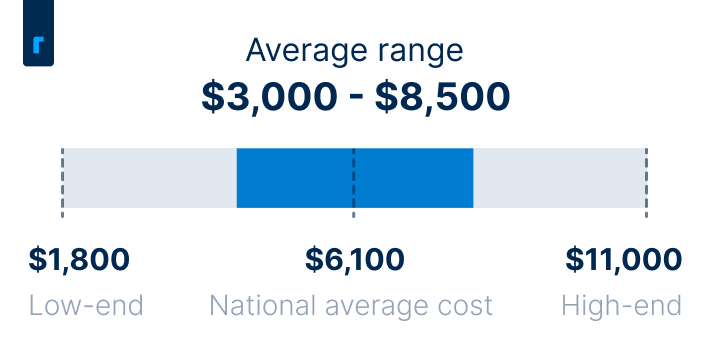
Boiler Replacement Cost by Fuel Type
One key factor that will play a part in determining your boiler cost is the fuel type you plan on using. Most homeowners stick with the fuel type they already have to save money on a conversion, so this choice could be made for you. Natural gas is the most common fuel type for home heating in the U.S., followed by electricity, primarily in the south. Oil is the most prevalent in the Northeast, and propane is common in rural areas.

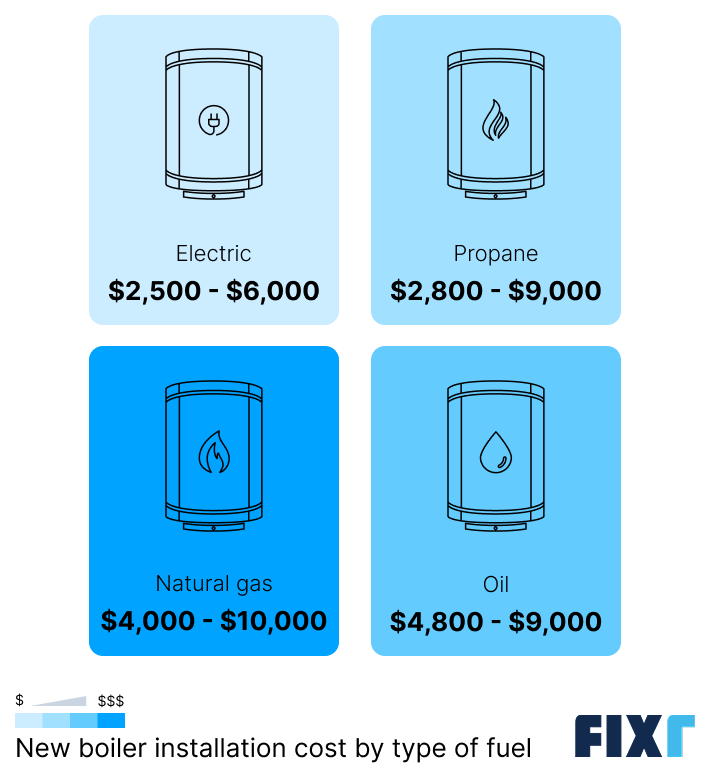
Fuel Type | Typical Cost |
$2,500 – $6,000 | |
$2,800 – $9,000 | |
Natural Gas | $4,000 – $10,000 |
$4,800 – $9,000 |
Electric
Electric boilers cost between $2,500 and $6,500 to replace. These use electricity and electric heating elements to heat water before distributing it through your home. They’re the most affordable, partially because they don’t require any special connections to gas lines or fuel tanks. They’re also the most efficient and most affordable to run, but they’re only suitable for hotter or moderate climates, like in southern states, where minimal heating is required.
Propane
Replacing a propane boiler costs between $2,800 and $9,000. These boilers run on propane, which you store in large tanks outside of your home. They’re popular in rural areas that don’t have natural gas connections. Propane boilers are more efficient than oil boilers, and they come with the same inconvenience of needing to remember to schedule fuel deliveries.
Natural Gas
Natural gas boilers are the most common type in the U.S., costing between $4,000 and $10,000 to replace, on average. These require a connection to a natural gas line, which isn’t available in all areas. They’re high-efficiency models, but they do come with the added risk of gas leaks, which can be dangerous. However, you never have to worry about scheduling fuel delivery as you would with oil or propane.
Oil
Oil boilers cost between $4,800 and $9,000 to replace. They run on fuel oil, which you store in a large tank, either outside of your home or in a basement or utility room. Oil boilers are the least efficient and the most expensive to run, but they have the highest output of heat. They’re prevalent in the Northeast, but in most of the country, gas boilers are more popular.
Cost of New Boiler by Boiler Type
There are a few different types of boilers you can install, all of which vary in their functionality, convenience, efficiency, and installation cost. System boilers are the most common in the U.S. and usually consist of a boiler and a standalone hot water heater to store hot water for cleaning and bathing. Aside from high-efficiency boilers, which really include all of the other types but with technology to achieve a higher level of efficiency, system boilers are the most expensive.

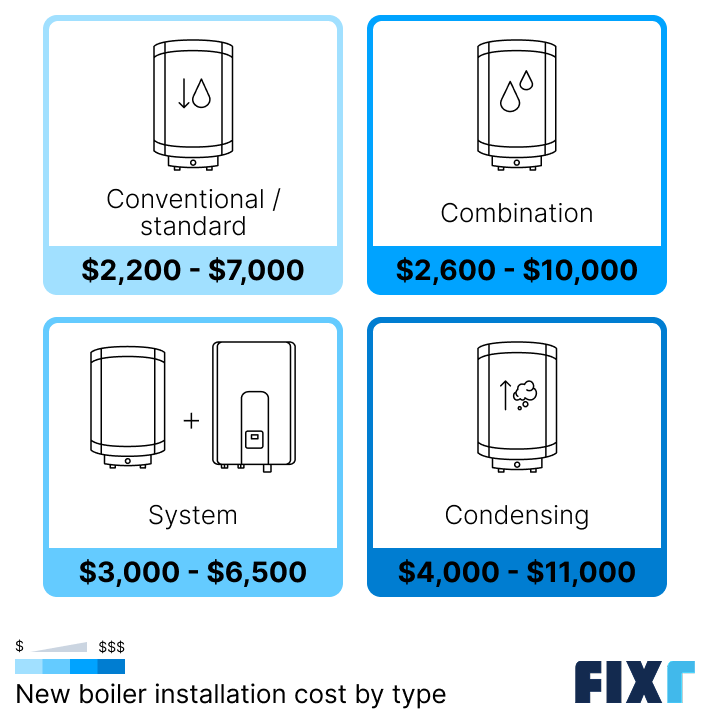
Type of Boiler | Cost Range |
Conventional/standard boiler | $2,200 – $7,000 |
Combination boiler | $2,600 – $10,000 |
System boiler | $3,000 – $6,500 |
Condensing boiler (high-efficiency) | $4,000 – $11,000 |
The types of boilers vary in price range, but you should consider how each of these options functions before deciding which is right for your home.
Conventional/standard boiler: Standard boilers are the most affordable, and they use a small cylinder to store some hot water internally. It’s possible to run out of hot water with this type, which is inconvenient.
Combination boiler: Combi boilers are more convenient than standard boilers. They are single units that provide on-demand hot water for your heating system, as well as hot water for domestic use. They’re more popular in smaller homes, where they’re more likely to be able to keep up with demand.
System boiler: System boilers heat water directly for your heating system, but they’re coupled with an indirect water heater that stores and re-heats water so that you always have hot water ready. These are ideal for larger homes with multiple bathrooms.
Condensing boiler: Condensing boilers have a special technology that recaptures heat from the system to improve efficiency. Any of the other boiler types can be condensing boilers. These are the most expensive to install, but they’re also the most efficient, so running costs tend to be lower.
Boiler Installation Cost by Home Size
Sizing your boiler appropriately for your home is crucial. Not only will the boiler size you choose affect your upfront costs, but it will also play a key role in your ongoing operational costs, the boiler efficiency, and your home’s comfort.
Larger homes with higher demands will require boilers with higher British thermal unit (BTU) ratings. You can use the table below to get an idea of what size boiler you need based on your home’s square footage. However, the output you need varies based on the climate in your area, the peak demand in your home, and more, so always have a professional determine what size boiler you need.
Home Size (Sq. Ft.) | BTUs Recommended | Cost Range |
1,000 | 40,000 | $4,000 – $6,500 |
1,500 | 60,000 | $4,500 – $7,000 |
2,000 | 80,000 | $5,100 – $8,000 |
2,500 | 100,000 | $5,500 – $8,800 |
3,000 | 120,000 | $6,000 – $10,000 |
What Size Boiler Do I Need?
Since sizing your boiler properly is so important and also complicated, it’s worth explaining how to get a more accurate estimate than just going based on your home’s square footage.
You should start with the square footage of the area you are heating, but you’ll also need to consider the climate zone you live in. Find your zone using this map from the U.S. Department of Energy, and then use the table below to see how many BTUs you need per square foot for efficient home heating.
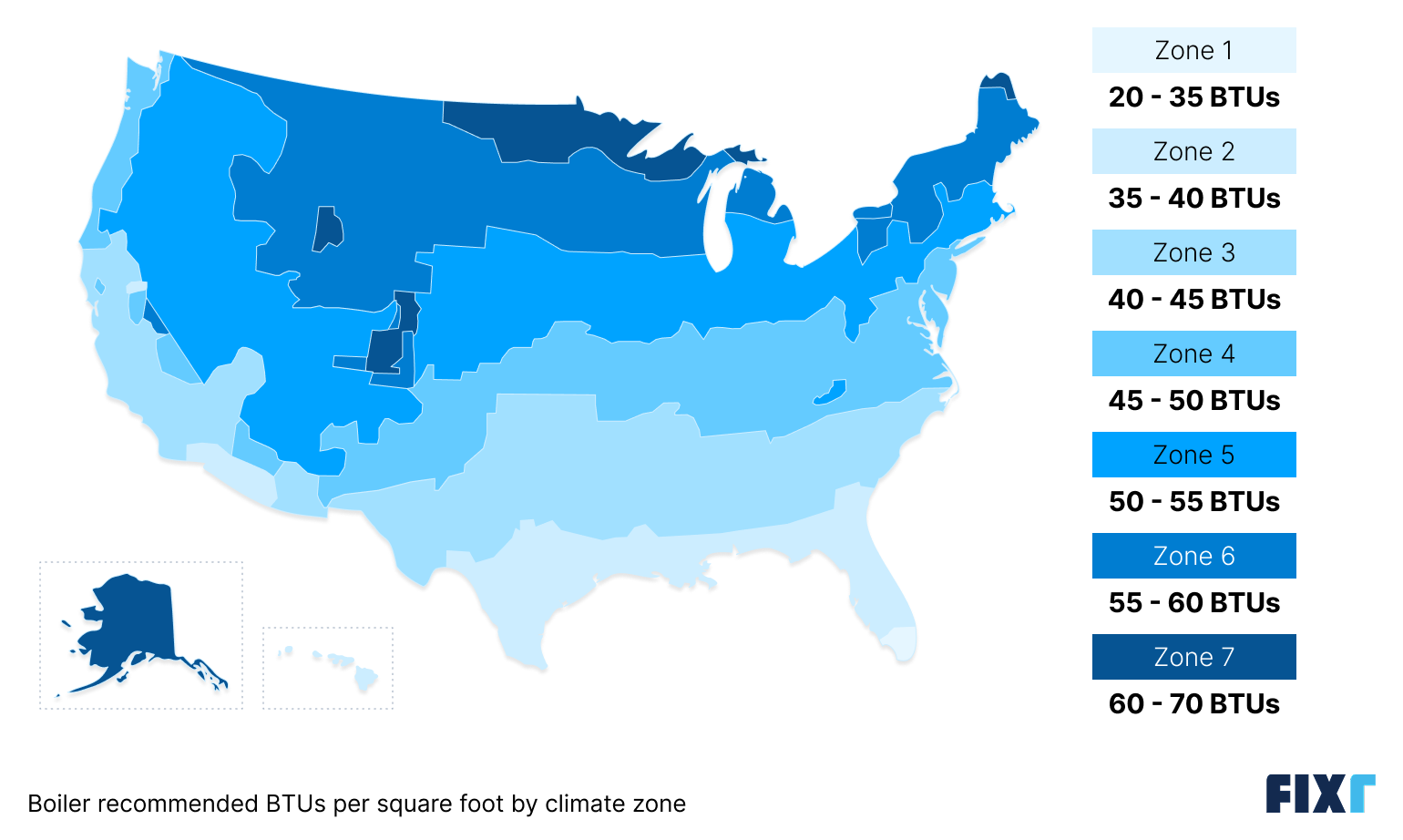
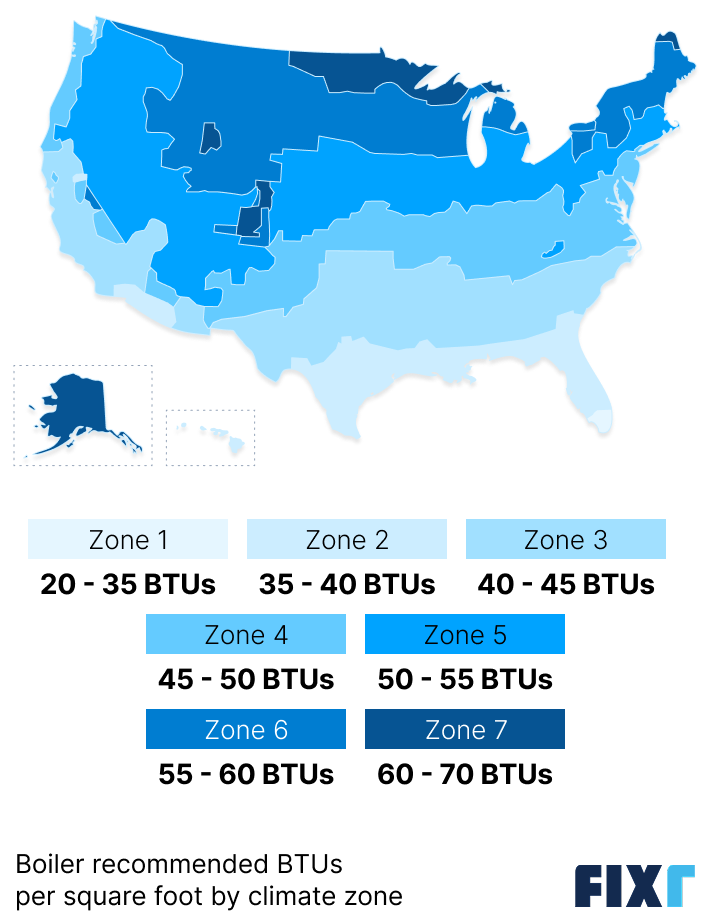
Climate Zone | BTUs per Sq.Ft. | Example (2,000 Sq.Ft. Home) |
Zone 1 | 20 – 35 | 40,000 – 70,000 BTUs |
Zone 2 | 35 – 40 | 70,000 – 80,000 BTUs |
Zone 3 | 40 – 45 | 80,000 – 90,000 BTUs |
Zone 4 | 45 – 50 | 90,000 – 100,000 BTUs |
Zone 5 | 50 – 55 | 100,000 – 110,000 BTUs |
Zone 6 | 55 – 60 | 110,000 – 120,000 BTUs |
Zone 7 | 60 – 70 | 120,000 – 140,000 BTUs |
Remember that hiring a pro is best when sizing your boiler. The estimates in the table above don’t account for many factors that influence the size you need, like your ceiling height, the quality and age of your home’s insulation, the insulative capabilities of your windows and doors, and more.
It’s also always worth hiring a pro because going too large will waste energy and can cause rapid cycling, which increases the risk of boiler failure. Going too small will mean insufficient heat for your home and an overworking boiler, which can also shorten the boiler’s lifespan.
Labor Costs for Boiler Replacement
On average, the labor for residential boiler replacement costs between $1,000 and $3,500. With most contractors, this will include uninstalling and hauling away your old boiler, but some contractors charge separately for that service.
Labor costs can climb significantly higher if you’re converting from one fuel source to another, or if you’re looking to relocate your boiler to a new section of your home. Both of these add-on services will require running new fuel or electrical lines, which can add hundreds to your total.
Factors Affecting Boiler Replacement Cost
Your home size, fuel type, and boiler type are the most influential cost factors to consider, but there are many other things that can bring your total costs up or down.
Boiler efficiency (AFUE): Boilers come with varying efficiency ratings, expressed as the annual fuel utilization efficiency (AFUE). This measures how much fuel they use for a given output. Higher-AFUE boilers cost more upfront but use less fuel, lowering running costs over time. They may also qualify for rebates or incentives, reducing the effective cost.
Boiler brand: The brand of boiler you choose can have a minor impact on pricing, as high-end brands like Lennox, Utica, and Peerless can drive material costs significantly higher. More costly brands sometimes come with better performance, more features, and longer warranty coverage, though, so upgrading could be worthwhile.
Installation complexity: The most affordable type of boiler installation will be swapping out an old boiler with a new one in the same location and with the same fuel source.
Permits: Most municipalities will require permits for projects involving water lines and fuel lines, so boiler replacement usually requires a permit. Permits for this project vary based on where you live, but expect permits to cost between $50 and $300 in most cases.
Location: Labor costs for boiler installation vary by location, reflecting local cost of living. Major cities, suburbs, and higher-cost states like New York and California typically have higher rates. Your location and climate also influence the size of boiler you need, affecting overall costs.
Is a Boiler Replacement Worth It?
Replacing an old boiler system is a significant investment, but it often provides a strong return. If you’re selling your home, any potential buyer will see enormous upside in a new heating system, as they’ll have more confidence that they’re not going to have to pay for repairs or replacements.
Even if you’re not selling your home, upgrading to a modern, high-efficiency boiler can lead to major energy savings by reducing your monthly energy bills. A new boiler also provides increased comfort and reliability, reducing the risk of breakdowns and the need for costly repairs that are common with older units.
Ultimately, if your unit is on its way out or is more than 10 to 15 years old, boiler replacement could be well worth the investment and could even pay for itself over time.
Additional Costs and Considerations
There are a few other auxiliary costs you may need to think about, as well as some other considerations to make when choosing a boiler and moving forward with the replacement.
Piping, radiator, or gas line repairs/upgrades: If you’re converting from one fuel type to another, you may need to add anywhere from $500 to $2,500 to your total to account for the added work needed. That can include capping gas lines, installing new gas lines, installing propane tanks, or putting in a high-voltage outlet for conversion to an electric system. You may also incur some of these fees if you’re relocating your boiler within your home.
Removing old boiler: Most professionals will include the cost of disconnecting and hauling away your old boiler in their labor costs. If they don’t, expect to add between $200 and $500 to your total, depending on the size and accessibility.
Emergency replacement: Boilers are essential for maintaining safety in your home during the colder weather. If yours goes down unexpectedly and you’re left without heat, you’ll need an emergency replacement. This can add hundreds to your pricing for the inconvenience it causes for your installer.
Electrical updates: For homeowners converting from gas, propane, or oil to electric for increased efficiency, an electrical panel upgrade may be necessary to support the heavier load. You’ll pay between $1,300 and $3,000 to upgrade to modern, 200-amp service.
Thermostat replacement: It’s a good idea to couple your new boiler with a new thermostat, which can give you more precise control over your unit and can further improve efficiency. Replacing a thermostat costs an average of $200, and most replacements total between $85 and $300.
Special features: Some modern boilers come with special features that can drive up material costs but often add convenience and efficiency that can be worthwhile. These include quieter operation, Wi-Fi compatibility for remote control, smart features that learn your habits and make recommendations for efficiency, and more.
Boiler Maintenance Costs
Routine maintenance is essential to ensure your boiler operates efficiently, remains safe to use, and lasts for its full lifespan to provide maximum value. An annual service typically costs between $200 and $500, and it includes a thorough inspection, cleaning, and tune-up to identify and address minor issues before they become major, expensive repairs.
Repair vs. Replace
One of the most important decisions to make when you run into a boiler issue is whether you should repair or replace it. In all cases, boiler repair costs less than total replacement upfront. Boiler repair costs an average of around $450, while a full boiler replacement costs an average of $6,100.
However, there are some cases in which a replacement is a better idea over the long run. If your boiler is over 15 years old, is no longer properly sized for your home, or has been giving you repeat problems and breakdowns, spending more on a replacement can help you avoid ongoing repair costs and higher running costs, which could eventually save you money.
How to Save on Boiler Replacement
Replacing your boiler is expensive, but there are a few things you can do to reduce the upfront cost and maximize your savings over time.
Shop around: Always get at least three quotes from different licensed and insured HVAC contractors. Compare not just the total price but also the specific boiler models, warranty terms, and labor costs to find the best value.
Choose the right time: Schedule your installation during the off-season, which is typically late spring or early fall. Contractors are usually less busy during this time, and they may offer small discounts on labor due to decreased demand.
Look for incentives and rebates: High-efficiency boilers are often eligible for energy efficiency rebates, tax credits, and other incentives. These programs can often save you hundreds or even thousands of dollars, not to mention the savings you’ll see on utility bills from going with a high-efficiency unit. Check the Database of State Incentives for Renewables and Efficiency (DSIRE) for eligibility.
Choose the right size boiler: Work with your contractor to choose a boiler that is correctly sized for your home. An oversized unit will cost more upfront and will operate inefficiently, while an undersized boiler will work overtime to provide heat and will usually not provide the same level of comfort and consistency.
Consider upgrading to a more efficient model: Boilers with higher AFUE ratings cost more upfront, but they usually save money in the long run on utility bills, especially if you live in an extremely cold climate.
Keep the installation simple: If possible, avoid relocating your boiler or switching from one fuel type to another. These add-on services can drive your costs up by thousands of dollars in some cases.
DIY vs. Hiring a Professional
Installing a boiler is not a recommended DIY project. The job involves complex plumbing, electrical, and gas line connections, making it extremely dangerous for an inexperienced homeowner. Mistakes can lead to serious safety hazards, including gas leaks, carbon monoxide poisoning, and electrical fires. Additionally, most municipalities require that you hire a professional to install or replace a boiler, so doing the work yourself is usually illegal anyway.
Always hire a licensed and insured HVAC professional for boiler installation. A pro will have the expertise, tools, and experience to perform the job safely and correctly, ensuring your new system is sized and vented properly and complies with all local codes.
FAQs
For a 2,000 sq. ft. home, the cost of a new boiler installation totals between $5,100 and $8,000, including materials and labor. However, boiler prices can range more widely depending on many factors, including the climate in your area, the age of your home, the quality of your insulation and windows, and your ceiling height. Consult a professional to size your new boiler properly.
The national average cost to install a new boiler ranges from $3,000 to $8,500, with most homeowners paying around $6,100. Your cost will range based on the type of boiler you choose, the fuel source you’re using, the size and heat output of your boiler, the unit’s efficiency rating, and more.
Yes, it is often worth replacing a 15-year-old boiler, as the Department of Energy recommends considering a replacement for a more efficient model after 15 years. Older boilers are prone to frequent and costly repairs and are much less energy-efficient than modern condensing units, which can save you money on your utility bills over time.
A boiler's average lifespan is around 15 years, but it can range quite a bit depending on the climate in your area, the type of boiler, the brand, and how appropriately it’s sized for your home. You can sometimes get more life out of your system if you carry out proper preventative maintenance.
In most cases, a professional HVAC technician can replace a boiler in 4 to 6 hours, as long as you’re not relocating the unit in your home or switching fuel types. If you need either of these add-on services, expect the job to take up to 4 days to complete.
Common signs you may need a new boiler include frequent breakdowns, rising energy bills, and unusual noises like banging or kettling. Most boilers last around 15 years, but efficiency drops with age. Repeated repairs, yellow flames indicating poor combustion, or heavy limescale buildup are strong indicators replacement may be more cost-effective.
